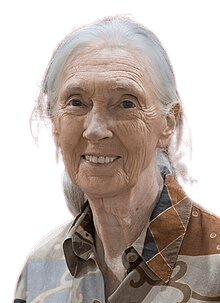Life and achievements
Early life
On April 3, 1934, Jane Goodall entered the world in London, England as the daughter of Mortimer Herbert Morris-Goodall and Margaret Myfanwe Joseph. Vanne, who wrote novels, served as her mother, and her father operated as a businessman. Jane Goodall developed an intense interest in animals and nature during her childhood. At one year old, her father presented Jubilee with the chimpanzee stuffed toy she kept throughout her life. Unlike typical young children, she chose to observe nature instead of doll play during her childhood.
The strength of her affection for animals continued to grow throughout her life. She dedicated numerous hours to observing birds together with insects and farm animals to understand their behaviors. During her fifth year, she did her first scientific observation by remaining hidden inside a henhouse to watch chickens produce eggs. The mother reacted by supporting Jane's interest because she recognized her strong commitment to animal knowledge.
Jane started her educational path at Uplands School in Bournemouth while performing well in biology and English classes. Due to limited financial means, her family had to enroll her in a secretarial course instead of attending university. Jane decided to work as a secretary while saving money for an African expedition since she aimed to start her career with animals. Jane immediately seized her friend's invitation to Kenya travel in 1957. Her life would transform permanently during this journey.
When she landed in Africa, Goodall accepted employment as a secretary for anthropologist and paleontologist Louis Leakey. The impressive combination of animal expertise and passion convinced Louis Leakey to allow her to study chimpanzees in Tanzania. Goodall's lack of scientific training did not hinder her field research because her dedication and patience proved her worthiness as a researcher. Leakey secured financial support for her Gombe research, and she embarked on what proved to be one of the most important scientific endeavors in history in 1960.
Jane encountered multiple difficulties during her initial years at Gombe because of scarce resources. Scientists doubted her work, and she needed to survive in the dangerous wilderness. Such an extensive research endeavor would have seemed impossible for an uneducated young woman during that period. Her dedication and unorthodox research techniques enabled her to discover revolutionary findings about primate-human connections and primatology.
Leakey obtained financial support that enabled Jane to enroll in the University of Cambridge, where she became one of the rare students to earn a Ph.D. without completing a bachelor's program. She obtained her doctorate in ethology through a 1966 graduation that studied chimpanzee social conduct. The significant findings from her research established the foundation for her future dedication to animal welfare and conservation throughout her career.
Legacy
Jane Goodall's scientific accomplishments represent only a small part of her lasting impact on the world. Through her research, she proved that animals have emotional capacities and display intellectual abilities and cultural characteristics. Her groundbreaking research expanded primatology science and developed new global approaches to conservation work.
The Jane Goodall Institute is her most significant contribution because it carries forward her work to defend chimpanzees while championing sustainable development. Through its expanded conservation programs across Africa, the institute operates sanctuaries that care for rescued chimpanzees. Through her Roots & Shoots program, established in 1991, young people from over 100 nations have gained the power to perform environmental and humanitarian work.
Goodall's advocacy work has resulted in changes to government policies about wildlife protection, deforestation, and ethical treatment standards for animals. She has delivered speeches to worldwide institutions, including the United Nations, to demand immediate action against climate change and habitat destruction. Through her work, she has achieved better conservation legislation while raising public consciousness about the immediate threat facing endangered species.
Her work inspires many scientists, activists, and environmentalists through her educational materials, such as books, lectures, and films. Students across the globe learn about animal conduct and conservation standards through her research materials, which serve as educational benchmarks in educational institutions worldwide. Through her efforts, she promotes sustainable living by teaching people to adopt environmentally friendly practices in their everyday routines.
The scientific and conservation achievements of Jane Goodall extend beyond her contributions to become an emblem of hope as well as perseverance. Her transformation from an animal enthusiast into a historical scientific giant has motivated numerous people to follow their dreams while making meaningful contributions to society. Her accomplishments demonstrated how dedication combined with curiosity and compassion results in remarkable achievements.
At ninety years old, Goodall remains active by traveling globally and delivering speeches to support environmental causes. Through her message, she demonstrates that every person can bring about change. She advocates for a sustainable future through collaboration between people who work in conservation alongside education and activism. Through her life's mission, she has proven that her unwavering dedication and passionate commitment will preserve her legacy for future generations.
Milestone moments
Jul 5, 1960
Arrival in Gombe
Jane Goodall starts her historical research on chimpanzees at Gombe in Tanzania.
Nov 5, 1963
National Geographic Feature
The National Geographic publication of her research made her work accessible to people worldwide.
Apr 24, 1965
First Documentary
National Geographic releases Miss Goodall and the Wild Chimpanzees, presenting her work to viewers worldwide.
Apr 16, 1977
Jane Goodall Institute Founded
She created the Jane Goodall Institute to serve as a platform for conservation education and environmental protection.
